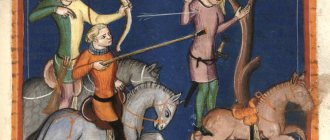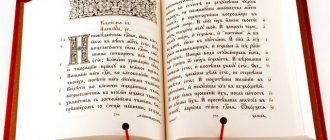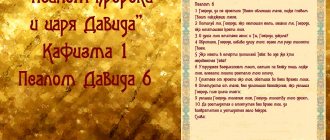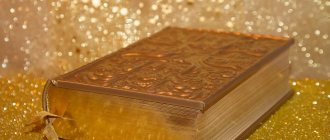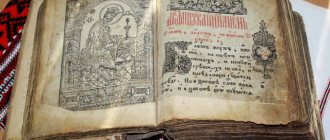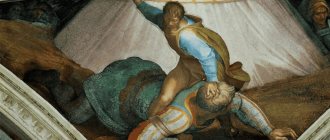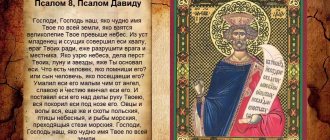Prophet David from the prophetic rank. Approx. 1654 89 × 68 cm. Yaroslavl Historical, Architectural and Art Museum Reserve
What does Psalm 50 “give” to a person who reads it regularly? What do the phrases mean: “according to the multitude of Your compassions, cleanse my iniquity” and “deliver me from bloodshed”; What is hyssop with which the worshiper asks to be sprinkled? Archpriest Georgy Gorodentsev explained everything spiritually important, curious and strange contained in the text of the psalm line by line and intelligibly.
Who wrote Psalm 50 and when?
This psalm was written by the prophet and psalmist David in the days when he was already established on the throne of the kingdom of Israel. At this time, the sorrows that he had previously had from King Saul became a thing of the past. And David, now a king himself, apparently relaxed in his spiritual life . Therefore, when he once climbed onto the roof of his Jerusalem palace and saw a naked woman bathing, instead of looking away and expelling the lustful thought from his heart, he sent a messenger to her. And even after learning that she was married to his own military leader Uriah, he still did not abandon his fornicating plan, which developed into adultery with Bathsheba (that was the name of this woman).
David and Bathsheba. Painting c. John the Baptist in Tolchkovo. Yaroslavl. 1694-1695
From this she conceived a child, and David, in order to hide his sin , summoned Uriah to Jerusalem. Who before that, as a military leader, fought on the borders of the kingdom with foreigners. However, he, like a real warrior, did not want to have a relationship with his wife during the war.
But David was unable to hide his adultery in such a way. To which he added an even more serious sin, ordering that Uriah, who had returned to war, be placed in the most dangerous place, and then retreat, leaving him alone against an entire army of enemies. And so Uriah died heroically on the battlefield, and the previously so righteous David added to the grave sin of adultery the even more grave sin of murder!
For this he was denounced by the prophet Nathan, sent by God. First, it was trivia, telling that two people lived in the same city: a rich one and a poor one. The first had many flocks of sheep and other domestic animals, but the second had only one little lamb, which he loved very much, and she was like a daughter to him. But when a stranger came to the rich man, for dinner he ordered not a sheep from his flock to be slaughtered, but a poor man’s sheep.
Prophet Nathan denounces David. Parisian Psalter
And when the king, outraged by this injustice, exclaimed that this rich man deserved death, Nathan said to him:
"You are that person."
And he pronounced before him a terrible prophecy from the Lord:
“This is what the Lord, the God of Israel, says: “I have anointed you king over Israel and delivered you from the hand of Saul. I have given you your master's house and your master's wives into your arms. I have given you the house of Israel and Judah. And if all this were not enough, I would give you even more. Why have you neglected the word of the Lord by doing evil in His sight? You struck Uriah the Hittite with the sword and took his wife as your wife. You killed him with the sword of the Ammonites. Therefore the sword will never depart from your house, since you despised Me and took the wife of the Hittite Uriah as your wife.”
(2 Kings 12: 7-10).
About when to read and how Psalm 50 helps
If the soul is crying, it is overwhelmed by complete confusion, heaviness, sins are pressing, then you should start reading Psalm 50. The sacred text is not so long: it consists of 12 sentences, each of which has its own dogma, the meaning must be understood from the first lines, imbued with it and sincerely believe in the written words. After reading, the anxiety goes away, bad thoughts stop creeping into your head, it becomes easy and good. Such repentance before God is necessary in order to be completely cleansed.
It doesn’t matter what kind of sin weighs on your soul - in any case, Psalm 50 can “cure” and “heal.” Believers should know that if the Lord God Himself forgives them all their sins, then hope for the best will settle in their hearts. What kind of sin must be in the soul for a believer to resort to this prayer? This can be either an insignificant act, for which the heart hurts greatly, or a terrible act. For example, from lying to pride, from rudeness to theft.
- Read the Jesus Prayer;
- Text of the prayer Psalm 90;
- Our Father Prayer - https://bogolub.info/otche-nash-molitva/.
Sin is measured differently for each person. The most important thing is that everyone understands for themselves that they have sinned and it is time to repent before the Lord before it is too late. Also, Psalm 50 is usually read in church. It is advisable to stand close to the altar, without approaching any icons. Only then can you separately approach those images for which you want to light candles. Be sure to be baptized and sincerely read Psalm 50.
The main idea of reading Psalm 50 is to pray before the Almighty and atone for your worst sin. This is the best prayer to ask for forgiveness before the Lord, morality to “rehabilitate”, understand the truth and never sin.
Unfortunately, today people do not treat faith as reverently as before, which means that after each commemoration they sin even more. That is why it is necessary to read Psalm 50, in order to at least in this way be pure before the Lord God, to pray that the Higher Powers not only forgive sinful people, but also direct them to the true path.
Why is it called repentant?
And in response to this denunciation and threatening prophecy, the holy King David showed his characteristic piety. After all, let us remember from the Holy Scriptures and Holy Tradition how the wicked kings dealt with such accusers?! At best, they subjected the prophets who threatened them to severe corporal punishment and imprisonment, and at worst, they executed them.
But this is not what the pious King David did. He humbly accepted this terrible prophecy. After him, in tears, ashes and sackcloth, he repented before God. The fruit of such tender poetic repentance was Psalm 50, which was then composed by the psalmist David.
For this, God reduced his punishment. So he avoided what he himself unwittingly predicted for himself, i.e. of death. But he did not escape this punishment completely. This is how his first son died from Bathsheba, then enmity began between his other sons, with one killing the other. When David forgave the murderer, he plotted against him and temporarily overthrew him from the throne. However, this rebellious son soon suffered a violent death.
Death of Absalom (German miniature, 14th century)
From this we, Orthodox Christians, can learn that with sincere repentance before God for our even grave sins, they are forgiven us and there will be no punishment for them in the afterlife. Like the psalmist David, who in due time (on the Resurrection of Christ) together with other Old Testament righteous people entered the Kingdom of Heaven.
But the punishment for these grave sins on earth and after our repentance is not completely canceled, but only diminished. As it was with King David in his earthly life
.
We can draw another edifying conclusion by observing in this entire biblical story the action of God’s Providence , which helps every good, and the evil that occurs through deviation from good, stops or directs to good consequences. The Lord did not stop David’s sin, for example, by striking him with illness or something else. But He directed this fall to good consequences, if only because the repentant king composed this penitential psalm to help all those who repent. And the wise Solomon was born to David from Bathsheba (cf. Matt. 1: 6).
Luca Giordano. The court of King Solomon, 17th century.
Main theme
Sincere repentance of a person who has gravely sinned, but who has realized his sin and repented of it, is the main theme of this psalm. So David, in some justification, refers to our common sinfulness passed down from our forefathers, i.e. to original sin. Although he understands that it is impossible for him to be justified at God’s court. But the sinner king sees his main hope and hope in the mercy of God. The only way through which he hopes to receive forgiveness.
Peculiarities
The main spiritual feature of Psalm 50 is that, being repentant, it represents that virtue which in Orthodox asceticism is called lamentation. grace lost due to sin and the wall that arose because of this between sinful man and God...
Interesting fact
Therefore, spiritually this psalm evokes sadness, unlike the vast majority of psalms, which, on the contrary, help to overcome sadness and despondency. The Holy Fathers advise reading the Psalter precisely during the attack of these last passions.
Only the sadness that is hidden in Psalm 51 is fundamentally different from that which is passion and with which we should fight. For the latter is sorrow for the world, and the first is sorrow for God. And as the Apostle Paul says:
“For Godly sorrow produces repentance that leads to salvation, but worldly sorrow produces death.”
(2 Cor.7:10).
Accordingly, this spiritual difference between Psalm 50 and the rest looks so outwardly that, if we use musical concepts, it seems to sound “in minor,” when the rest of the psalms are “in major.”
BACK (To previous page)PREVIOUS PRAYER
NEXT PRAYER
Psalm 50, repentance
Have mercy on me, O God, according to Your great mercy, and according to the multitude of Your mercies, cleanse my iniquity. Above all, wash me from my iniquity, and cleanse me from my sin. For I know my iniquity, and I will take away my sin before me. I have sinned against You alone, and I have done evil before You; for you may be justified in all Your words, and be victorious, and never judge You. Behold, I was conceived in iniquity, and my mother gave birth to me in sins. You have loved the truth; you have revealed to me the unknown and secret wisdom of Yours. Sprinkle me with hyssop, and I will be cleansed; Wash me, and I will be whiter than snow. My hearing brings joy and joy; humble bones will rejoice. Turn Your face away from my sins, and cleanse all my iniquities. Create in me a pure heart, O God, and renew a right spirit in my womb. Do not cast me away from Your presence, and do not take Your Holy Spirit away from me. Reward me with the joy of Your salvation, and strengthen me with the Master’s Spirit. I will teach the wicked Your way, and the wicked will turn to You. Deliver me from bloodshed, O God, God of my salvation; My tongue will rejoice in Your righteousness. Lord, open my mouth, and my mouth will declare Your praise. As if you had desired sacrifices, you would not have given burnt offerings. The sacrifice to God is a broken spirit; God will not despise a broken and humble heart. Bless Zion, O Lord, with Your favor, and may the walls of Jerusalem be built. Then you will be pleased with the sacrifice of righteousness, the offering and the burnt offering will then lay the bullock on Your altar.
Generosity
- generous mercy;
mercy, compassion, pity. Most
- especially, most of all (
more
- more).
Yako
-
here:
for, because.
I will take it out
- always, at all times, incessantly.
Always judge You
- when You judge (
ever
- when).
Behold
- here, truly (
behold
;
bo
- for, because; in combination).
You have shown me the unknown and secret of Your wisdom
- the unknown (hidden) and secret (that is, the hidden secret) of Your wisdom You have shown to me.
Hyssop
is an herb used as a sprinkler.
Dasi
- give it.
Humble bones
are crushed, broken (as we say about illness or extreme fatigue).
Create
- create, do.
The womb
is
here:
the innermost, hidden, invisible depth of the soul.
Ustne
- lips, mouth (dual number from
orstna
- lip);
mouth
- mouth.
If only
- if only.
Ubo
–
here:
truly.
Burnt offering
, or
burnt offering
, is a sacrifice in which the entire animal was burned without a trace on the altar.
Zion is
the mountain in Jerusalem on which the House of David was built; symbol of the Church.
This psalm was composed by the prophet David when he repented of his great sin - that he killed the pious Uriah the Hittite in order to take possession of his wife Bathsheba (2 Sam. 11-12). The psalm expresses deep contrition for the sin committed and a fervent prayer for mercy and shows all people the saving path of repentance; That is why it is often read in Church during services. All of us, guilty of certain sins, should pronounce it as often as possible, delving into every word.
+ Have mercy on me, O God, according to Your great mercy, and according to the multitude of Your mercies, cleanse my iniquity.
The sin is great, so the prophet asks God for great mercy. Only God's ineffable mercies can cleanse grave iniquity.
Above all, wash me from my iniquity, and cleanse me from my sin.
The Lord has already announced to David through the prophet Nathan that he is absolving him of his sins for repentance (2 Sam. 12, 13) - but David prays that God will completely cleanse him of sinful impurities. So we, too, having received remission of our sins in the Sacrament of Repentance, must still continually cry out to the Lord so that he will destroy the very root of sin in us.
For I know my iniquity, and I will take away my sin before me.
Have mercy, Lord, cleanse me! Sin weighs heavily on me, I cannot forget it, I see it day and night in my conscience, which constantly disturbs my soul.
I have sinned against You alone, and have done evil before You, so that You may be justified in Your words, and be victorious, and never judge You (
in the Russian translation of the psalm: so You are righteous in Your judgment and pure in Your judgment). The prophet presents himself not to human, but to God's court (David is a king, and he is not afraid of human judgment). Hiding lawlessness from people, you cannot hide it from the Supreme Judge, Who sees everything secret; Before God's truth, our wickedness is exposed - our untruth and wrongness, and all our excuses are powerless.
Behold, I was conceived in iniquities, and my mother gave birth to me in sins.
All of us, descendants of Adam, are conceived in sins, inheriting original sin. We plead with God for forgiveness by presenting to Him our natural tendency to sin.
Behold, you loved the truth...
(pay attention to the word
thou art
- it indicates the 2nd person: behold,
thou
hast loved the truth).
You, Lord, You yourself are the Truth ( I am the way and the truth and the life
- John 14:6), You love the truth and want us to remain in the truth. And I confess that You Love the truth and hate lies, therefore I confess and acknowledge before You that I have sinned.
You have revealed to me Your unknown and secret wisdom
- the unknown (hidden) and secret (that is, the hidden secret) of Your wisdom You showed me.
(King David speaks about his prophetic gift, that God, by the Holy Spirit, revealed to him the inexpressible secrets of His Providence; but every Christian also receives in the Sacraments of the Church the gifts of the Holy Spirit and through the teaching of the Church touches the hidden secrets of God’s Providence, and each of us is told the unknown and secret wisdom
of God: we have been taught the true faith, we have been shown the path to the Kingdom of Heaven.) How did I respond to these gifts of grace? Sin!
Sprinkle me with hyssop, and I will be cleansed; Wash me, and I will be whiter than snow.
Here is the hope of completely getting rid of sin and being filled with joy. The prophet likens the action of the Holy Spirit, which cleanses all filth in us, to hyssop. Saint Athanasius the Great sees in this image a hidden image of cleansing in the Sacraments by the Blood of Christ - which alone can cleanse completely and make it whiter than snow.
My ears hear joy and joy...
Give me, my hearing, the gracious news of pardon, rejoice and rejoice me!
Humble bones will rejoice.
The sin committed crushes not only the soul, but also the body: under the weight of sin, the bones become weak and humble; when the sin is forgiven and the unbearable burden is removed from the conscience, then the whole body is filled with joy (remember how sometimes we sigh with deep relief and straighten our shoulders).
Turn Your face away from my sins, and cleanse all my iniquities
- erase from the book of my life.
Create in me a pure heart, O God, and renew a right spirit in my womb.
Restore the fallen soul to primeval beauty, destroying in me the impurity of ancestral sin. Give me the grace of rightness!
“A pure heart, I believe, is in someone who not only is not disturbed and burdened by any passion, but also does not even think about anything bad or worldly, even if he wanted it, and keeps only the memory of God in himself with uncontrollable love. For the eye of the soul, the mind, when nothing interferes with its contemplation, sees God purely in pure light.”
Venerable Simeon the New Theologian
(Philokalia, vol. 5)
Do not cast me away from Your presence, and do not take Your Holy Spirit away from me.
Sin separates us from God, from the Source of Life - and we pray that we do not find ourselves in pitch darkness, where the face of God is not visible;
By the Holy Spirit, every soul lives
according to the hymn of the Church - we pray that He, the Giver of Life, will not be taken away from us.
Reward me with the joy of Your salvation, and strengthen me with the Master’s Spirit.
Reward, return to me the joy that I enjoyed when I was protected by You; give me the gifts of the Holy Spirit.
“Have mercy, my Lord, over my distress, into which I have fallen, having lost Your grace, and again restore Your grace to me. by the Sovereign Spirit
(Ps. 50:14), strengthen me with the spirit of Your power, so that I can resist temptations inflicted by the devil, and temptations arising from my fallen nature.”
Venerable Paisiy Velichkovsky
(Interpretation of the prayer “Lord, have mercy.” - Philokalia, vol. 5)
I will teach the wicked Your way, and the wicked will turn to You.
When You deliver me from sin and give me the Holy Spirit, I will be able to teach lawbreakers again so that they walk in Your ways,” David, his chosen one, says to the Lord.
And for us, this vow contains the same thought as in the petition of the Lord’s Prayer: Hallowed be Thy name
in us, Lord; for if You cleanse our sins and by Your grace we begin to live according to Your will, then with our very lives we will be able to preach Your truth and turn the hearts of people to You.
Deliver me from bloodshed, O God, God of my salvation...
The prophet David asks God to save him from the shed blood of Uriah, in which he seems to be drowning (from blood is a more accurate translation of the words of the psalm).
The words God of my salvation
are equivalent to the words
God of my Savior
- an appeal to our Lord and Savior Jesus Christ. With these words of the prophet, we cry out to the Savior to deliver us from the murderous effect of our sins.
My tongue will rejoice in Your righteousness. Lord, open my mouth, and my mouth will declare Your praise.
My lips are now sealed with sin. Having received remission of sins, I will not remain silent, but will begin to testify about You, sing and glorify Your mercies.
As if you had desired sacrifices, you would have given them: you do not favor burnt offerings.
You, Lord, have abolished the sacrifices under the law, which cannot grant remission of sins: an external sacrifice, offered without the participation of the heart, has no meaning.
The sacrifice to God is a broken spirit; God will not despise a broken and humble heart.
The sacrifice that You loved is repentance and contrition of heart;
You will not despise a contrite and humble heart, O God (Russian translation). This is who I will look upon: the one who is humble and contrite in spirit and who trembles at My word,
” says the Lord through the prophet Isaiah (66:2).
Wed.
the words of another psalm:
The Lord is close to the brokenhearted and will save the humble in spirit
(Ps. 33:19).
“True prayer is the voice of true repentance. When prayer is not animated by repentance, then it does not fulfill (its purpose, then God is not pleased with it. He will not despise a broken spirit, a contrite and humble heart
».
Saint Ignatius Brianchaninov
Bless Zion, O Lord, with Your favor, and may the walls of Jerusalem be built together.
King David prays not only for himself, but also for his city and people, and asks the Lord to restore the walls of Jerusalem, shaken by his sin. But Zion and Jerusalem in Holy Scripture also depict the entire Church.
Then favor the sacrifice of righteousness, the offering and the burnt offering; Then they will place the bullock on Your altar.
The psalm ends with the image of a sacrifice to God, offered in purity of heart and righteousness; Having cleansed the soul through repentance, we will rush to God with our whole being and give Him ourselves entirely, our whole heart, our whole life - this will be our “burnt offering.”
NEXT PRAYER
PREVIOUS PRAYER
BACK (To previous page)
Psalm 50 in Orthodox and Catholic worship
In Orthodox worship , this is the most frequently used psalm. It reads:
- in front of a row of canons;
- in the rite of confession;
- at matins;
- this is one of the three psalms of the third hour;
- as a secret prayer, it is read by the clergy at the liturgy before the Great Entrance
Two verses of this psalm are also recited by the priest at the Eucharistic Canon.
In Latin Rite Catholic worship, the first verses of Psalm 50 (Ps. 50:1–4) are read or sung:
- during the Sunday liturgy during the initial rites of the Mass;
- often they are combined with sprinkling parishioners with blessed water;
- sung between the first and second biblical readings;
- selected verses of the psalm are used as antiphons during Ash Wednesday services
- in the Liturgy of the Hours, the psalm is part of Matins, where it is read every Friday
The psalm is often used in individual prayer practice, especially during Lent.
Line by line interpretation of Psalm 50
Inscription of Psalm 50:
“In the end, a psalm to David, when Nathan the prophet came to him, when he went to Bathsheba, Uri’s wife.”
The meaning of this inscription is clear from the above. Convicted of his sin by the prophets Nathan, David wrote this repentant psalm.
1 “Have mercy on me, O God, according to Your great mercy, and according to the multitude of Your compassions, cleanse my iniquity.”
Any sinner, including King David, has no justification in himself. But he can only hope for the mercy and bounty of God.
2 “Wash me above all from my iniquity, and cleanse me from my sin.”
For only God can wash away our iniquities and cleanse our sins through our repentance.
3 “For I know my iniquity, and bear away my sin before me.
4 I have sinned against You alone, and have done evil before You, so that You may be justified in Your words and overcome, and never judge You.”
David is aware of his sin and knows that he alone is to blame for it. Therefore, he is not going to justify himself and sue God, as many unrepentant sinners do, not knowing that the Lord will always defeat them at such a trial!
5 “Behold, I was conceived in iniquity, and my mother gave birth to me in sins.”
David was born not from fornication, but from chaste parents who were legally married. Therefore, the lawlessness and sin in which he was born is original sin, transmitted from the first parents to all people.
6 “For Thou hast loved the truth, Thou hast revealed to me Thy unknown and secret wisdom.”
But despite the original sinfulness of man, the love of truth remained in him. And David, as a psalmist, was even more honored to know many of the mysteries of God.
7 “Sprinkle me with hyssop, and I will be clean; wash me, and I will be whiter than snow.”
Hyssop is a certain plant (which one is currently unknown) used in Old Testament worship. Usually, bunches of this plant, dipped in the blood of sacrificial animals, were sprinkled or anointed on people, as well as sacred objects, in the rite of consecration. This is what David asks in a figurative sense, asking the Lord to cleanse him from sin and make him whiter than snow.
8 “Give joy and gladness to my hearing; humble bones will rejoice.”
Here we are talking about spiritual hearing, i.e. the feeling of liberation from sin, which is given to every sincerely repentant sinner.
9 “Turn away Your face from my sins, and cleanse all my iniquities.”
Repetition of previous requests. Repeating something useful is always useful in itself.
10 “Create in me a pure heart, O God, and renew a right spirit in my womb.”
Our passions nest in the heart. Therefore, David asks the Lord to cleanse his heart from these passions, for only He can do this. And by this a person can justify before God, i.e. acquire in oneself the “spirit of rights.”
11 “Do not cast me away from Your presence, and do not take Your Holy Spirit from me.”
Rejection of a person for sins from the face of God deprives such a rejected person of the grace of the Holy Spirit. Why does David ask the Lord not to take this grace away from him? Considering that he wrote this blessed psalm at the same time, one can understand that the Lord did not deprive Him of His grace.
12 “Reward me with the joy of Your salvation, and strengthen me with the Lord’s Spirit.”
The grace of God abiding in man is the guarantee of his salvation. This is what makes him master of passions. Why does David call the Holy Spirit the “Sovereign Spirit.”
13 “I will teach the wicked your way, and the wicked will turn to you.”
Like the psalmist and the king, i.e. the shepherd of many people, this grace of the Holy Spirit is necessary for David not only for personal salvation, but also for bringing others to salvation, even the lawless and wicked.
14 “Deliver me from bloodshed, O God, God of my salvation; my tongue will rejoice in Your righteousness.”
Literally, David asks the Lord to forgive him his most serious sin - the lawless murder (shedding of blood) of Uriah. In a figurative sense, we Christians all sin before the Blood of Christ when, having received Holy Communion, we go to sin again. Therefore, reading this psalm, we ask you to save us from this and the punishment for it.
15 “Lord, you have opened my mouth, and my mouth will declare your praise.”
David, who repents, feels God's forgiveness. Therefore, He asks Him Himself to put worthy praise into the mouth of the psalmist.
16 “Even if you had desired sacrifices, you would have given burnt offerings, but you would not be pleased.” 17 A sacrifice to God is a broken spirit, a contrite and humble heart, God will not despise.”
David understands that the sacrifices of bulls and goats in themselves cannot be pleasing to God. But, as the Venerable Simeon the New Theologian says on this occasion, there are only two sacrifices pleasing to Him: the Sacrifice of the Son of God on the cross and the contrite and humble heart of a repentant person.
18 “Bless Zion, O Lord, with Your favor, and may the walls of Jerusalem be built. 19 Then you will be pleased with the sacrifice of righteousness, the wave offering and the burnt offering: then they will lay the bullock on Your altar.”
In a literal sense, this meant the actual architectural and fortification creation of Jerusalem, which was rebuilt by David. As well as the future construction of the Jerusalem Temple, where the Old Testament sacrifice was offered to God.
Jerusalem Temple
In a figurative sense, we are talking about the future stay of a Christian in spiritual Jerusalem. And to his aforementioned sacrifice in the form of a contrite and humble spirit.
Psalm 50 - text in Russian, how to read correctly
Have mercy on me, O God, according to Your great mercy, and according to the multitude of Your mercies, cleanse my iniquity. Above all, wash me from my iniquity, and cleanse me from my sin; for I know my iniquity, and I will take away my sin before me. I have sinned against You alone and have done evil before You, so that You may be justified in Your words and triumph over the judgment of You. Behold, I was conceived in iniquities, and my mother gave birth to me in sins. Behold, you have loved the truth; You have revealed to me the unknown and secret wisdom of Yours. Sprinkle me with hyssop, and I will be cleansed; Wash me, and I will be whiter than snow. My hearing brings joy and joy; humble bones will rejoice. Turn Your face away from my sins and cleanse all my iniquities. Create in me a pure heart, O God, and renew a right spirit in my womb. Do not cast me away from Your presence and do not take Your Holy Spirit away from me. Reward me with the joy of Your salvation and strengthen me with the Lord’s Spirit. I will teach the wicked Your way, and the wicked will turn to You. Deliver me from bloodshed, O God, God of my salvation; My tongue will rejoice in Your righteousness. Lord, open my mouth, and my mouth will declare Your praise. As if you had desired sacrifices, you would have given them: you do not favor burnt offerings. The sacrifice to God is a broken spirit; God will not despise a broken and humble heart. Bless Zion, O Lord, with Your favor, and may the walls of Jerusalem be built. Then favor the sacrifice of righteousness, the offering and the burnt offering; Then they will place the bullock on Your altar.
Psalm 50
Psalm 50 is considered one of the most frequently used sacred texts from the Book of Psalms. This is a kind of morning prayer, relating to the canons of the Mother of God, the Guardian Angel, and Communion. The meaning of Psalm 50 is contrition, repentance for having once committed a sin. This is a prayer for mercy, for the Lord God to forgive for everything that was done right and wrong.
How to read correctly
It is necessary to read, like any psalm, slowly, measuredly, listening with mind and heart to what is being read. The peculiarity of the 50th Psalm is that the one who honors it should try to experience a deep feeling of repentance. We are all sinners, we just need to see and remember our sins. Then during this reading there will be repentance and repentance!
About the power of prayer
When reading the 50th Psalm, demons are driven away and passions subside for a while. But, of course, it greatly disposes us sinners to repentance, which in itself is very valuable!
In what cases is it read?
When it is read during worship, this was indicated above. In addition, it is in the morning prayers for every day. If sins overcome you, then you can read it much more often than once a day in the morning. For example, you can read forty times.
Why do they read 40 times in a row?
Because forty is considered a sacred number in asceticism. That is how many days the Lord, teaching us Christian asceticism, fasted in the desert. After which this number, meaning the completeness of the ascetic feat, entered our prayer routine.
How does reading Psalm 50 help?
In ascetic warfare with the flesh, the world and the devil, and also promotes our repentance.
Examples of appeal and assistance
Any Christian who brings true repentance brings it as it is written in Psalm 50. So the Venerable Mary of Egypt, although illiterate, repented and was saved, undoubtedly offering her “broken spirit, contrite and humble heart” as a favorable sacrifice to God. Well, then she, enlightened by the Holy Spirit in the desert, knew the Holy Scriptures by heart and quoted them, as Elder Zosima noted. Obviously, she also knew the 50th Psalm, praying with its help.
Holy Venerable Mary of Egypt
The same can be said about all Orthodox ascetics. Who not only brought repentance according to the canons of the 50th Psalm, but knew it by heart and prayed with its help.
Lay People's Life-Changing Prayer Experiences
Such were all saints, especially those who moved from great sins to even greater holiness. This is not only the Venerable Mary of Egypt , but also the repentant ancient persecutors of Christians, who themselves then became Christians and martyrs. And the first of them was Saul, who later became the Apostle Paul. These are robbers and harlots, who later became saints. And of course, in their daily prayer routine, the 50th psalm of repentance always came first!
Archpriest Georgy Gorodentsev
Prayer
“Have mercy on me, O God, according to your great mercy, and according to the multitude of your compassions, cleanse my iniquity.
Above all, wash me from my iniquity and cleanse me from my sin; for I know my iniquity, and I will bear my sin before me. You alone have sinned and done evil before you; so that you may be justified in all your words and be victorious, never judge you. Behold, I was conceived in iniquity, and my mother gave birth to me in sins. Behold, you loved the truth, you showed me your unknown and secret wisdom. Sprinkle me with hyssop, and I will be cleansed; Wash me, and I will be whiter than snow. My hearing brings joy and joy; The humble bones will rejoice. Turn your face away from my sins and cleanse all my iniquities. Create in me a pure heart, O God, and renew a right spirit in my womb. Do not cast me away from your presence and do not take your Holy Spirit from me. Reward me with the joy of your salvation and strengthen me with the sovereign spirit. I will teach the wicked your way, and the wicked will turn to you. Deliver me from bloodshed, O God, God of my salvation; my tongue will rejoice in your righteousness.
Lord, open my mouth, and my mouth will declare your praise. As if you had wanted this sacrifice, you would have given it; You do not favor burnt offerings. The sacrifice to God is a broken spirit; God will not despise a broken and humble heart. Bless Zion, O Lord, with your favor, and may the walls of Jerusalem be built; then be pleased with the sacrifice of righteousness, the offering and the burnt offering; Then they will place bullocks on your altar.”
Modern translation into Russian (Synodal)
Menu
Psalm 50 on Wikisource
1 To the director of the choir. Psalm of David, 2 When the prophet Nathan came to him, after David had gone in to Bathsheba.
3 Have mercy on me, O God, according to Your great mercy, and according to the multitude of Your compassions blot out my iniquities. 4 Wash me often from my iniquity, and cleanse me from my sin, 5 for I acknowledge my iniquities, and my sin is always before me. 6 You, You alone, have I sinned and done evil in Your sight, so that You are righteous in Your judgment and pure in Your judgment. 7 Behold, I was conceived in iniquity, and my mother bore me in sin. 8 Behold, You have loved the truth in your heart, and You have shown me wisdom within me. 9 Sprinkle me with hyssop, and I will be clean; Wash me, and I will be whiter than snow. 10 Let me hear joy and gladness, and the bones broken by You will rejoice. 11 Turn away Your face from my sins and blot out all my iniquities. 12 Create in me a clean heart, O God, and renew a right spirit within me. 13 Cast me not away from Thy presence, and take not Thy Holy Spirit from me. 14 Restore to me the joy of Your salvation and strengthen me with the sovereign Spirit. 15 I will teach the wicked your ways, and the wicked will turn to you. 16 Deliver me from bloodshed, O God, God of my salvation, and my tongue will praise Your righteousness. 17 Lord! Open my mouth, and my mouth will declare Your praise: 18 For You do not desire sacrifice, I would give it; You do not favor burnt offerings. 19 The sacrifice to God is a broken spirit; You will not despise a contrite and humble heart, O God. 20 Bless Zion according to Your good pleasure; Build up the walls of Jerusalem: 21 Then the sacrifices of righteousness, the heave offering and the burnt offering, will be acceptable to You; Then they will place bullocks on Your altar.
Prayer
Have mercy on me, O God, according to Your great mercy, and according to the multitude of Your mercies, cleanse my iniquity.
Wash me from my iniquity many times, and cleanse me from my sin. For I am aware of my iniquity, and my sin is always before me. You alone have I sinned and done evil before You, so that You will be righteous in Your judgments and will be victorious when You judge. For behold, I was conceived in iniquities, and my mother gave birth to me in sins. But You loved the truth: You showed me the unknown and secret things of Your wisdom. Sprinkle me with hyssop, and I will be clean; wash me, and I will become whiter than snow. You will bring joy and gladness to my ears: humble bones will rejoice.
Turn Your face away from my sins, and cleanse all my iniquities. Create in me a clean heart, O God, and renew a right spirit in my womb. Do not cast me away from Your presence, and do not take Your Holy Spirit from me. Give me the joy of Your salvation, and strengthen me with the Sovereign Spirit. I will teach the wicked Your ways, and the wicked will turn to You. Deliver me from (shedding) blood, O God, God of my salvation! My tongue will rejoice in Your righteousness.
God! Open my mouth, and my mouth will declare Your praise. If You wanted a sacrifice, I would give it, (but) You do not favor a burnt offering. A sacrifice to God is a contrite spirit; God will not despise a contrite and humble heart. Bless Zion, O Lord, with Your favor, and may the walls of Jerusalem be built. Then you will be pleased with the sacrifice of righteousness, the wave offering, and the burnt offering; Then they will place bullocks on Your altar.
Psalm 50 in Russian:
Have mercy on me, O God, according to Your great mercy, and according to the multitude of Your mercies, blot out my iniquities. Wash me often from my iniquity, and cleanse me from my sin, for I am aware of my iniquities, and my sin is always before me. You, You alone, have I sinned and done evil in Your sight, so that You are righteous in Your judgment and pure in Your judgment. Behold, I was conceived in iniquity, and my mother gave birth to me in sin. Behold, You loved the truth in my heart and showed me Your wisdom within me. Sprinkle me with hyssop, and I will be clean; Wash me, and I will be whiter than snow. Let me hear joy and gladness, and the bones broken by You will rejoice. Turn Your face away from my sins and blot out all my iniquities. Create in me a clean heart, O God, and renew a right spirit within me. Do not cast me away from Your presence and do not take Your Holy Spirit from me. Restore to me the joy of Thy salvation and strengthen me with the sovereign Spirit. I will teach the wicked Your ways, and the wicked will turn to You. Deliver me from bloodshed, O God, God of my salvation, and my tongue will praise Your righteousness. God! Open my mouth, and my mouth will declare Your praise: for You do not desire sacrifice, I would give it; You do not favor burnt offerings. A sacrifice to God is a broken spirit; You will not despise a contrite and humble heart, O God. Bless Zion, O Lord, according to Your good pleasure; build up the walls of Jerusalem: then the sacrifices of righteousness, the heave-hoist and the burnt offering will be acceptable to You; Then they will place bullocks on Your altar.
